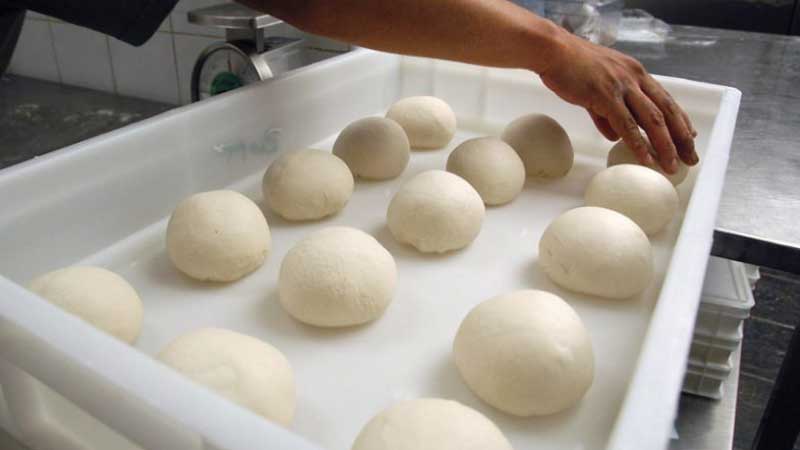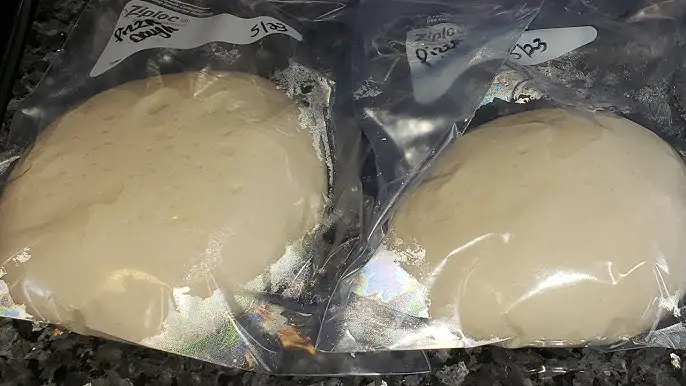Storing pizza dough overnight is a common practice that can enhance the flavor and texture of your homemade pizza. The slow fermentation process that occurs in the refrigerator allows the yeast more time to work on the dough, creating a more complex flavor profile and improving its elasticity. This method also provides the convenience of being able to prepare your dough in advance, saving time on the day you plan to make your pizza. In this guide, we’ll walk you through the steps to properly store pizza dough overnight, including preparation, wrapping, and refrigeration, to ensure that your dough remains fresh and is in optimal condition for pizza-making the next day.
Storing pizza dough overnight can actually enhance its flavor and texture due to the slow fermentation process that occurs in the refrigerator. Here’s a detailed guide on how to do it:

Ingredients and Tools Needed:
- Prepared pizza dough
- Olive oil or cooking spray
- Plastic wrap or airtight container
- Optional: Resealable plastic bags
- Refrigerator
Steps:
1. Initial Proofing (Optional)
If your recipe calls for an initial proofing period, make sure to complete that before refrigerating. This usually involves letting the dough sit at room temperature for a short period (30 minutes to 1 hour) to allow it to rise.
2. Portion the Dough
If you’ve made multiple pizza dough balls, now is a good time to divide them into the portion sizes you’ll want for individual pizzas.
3. Lightly Oil
Drizzle a small amount of olive oil over the dough or spray it lightly with cooking spray. This helps prevent the dough from drying out and sticking to the wrapping. Use your hands to gently coat the dough with the oil.
4. Wrapping
Wrap each dough ball tightly in plastic wrap. Make sure there are no exposed areas; otherwise, the dough could form a crust or dry out.
5. Additional Airtight Layer (Optional)
For extra protection against drying, you can place the wrapped dough balls in a resealable plastic bag or an airtight container.
6. Label and Date
If you’re making different types of dough or simply want to keep track of when the dough was made, add a label with the date and type of dough.
7. Refrigerate
Place the wrapped or containerized dough in the refrigerator. Store it in a location where it won’t be disturbed, preferably on a flat surface. The ideal temperature is between 35°F and 40°F (1°C and 4°C).
8. Overnight Fermentation
Leave the dough in the refrigerator for at least 12 to 48 hours. This slow fermentation will allow the flavors to develop and also make the dough easier to shape.
9. Before Use
About 1 to 2 hours before you’re ready to make your pizza, take the dough out of the refrigerator to allow it to come to room temperature. This will make it easier to shape and result in a better-textured crust.

Additional Tips:
- Freezing: If you plan on storing the dough for more than 48 hours, consider freezing it. Make sure to use airtight packaging to minimize freezer burn.
- Degassing: Don’t be alarmed if your dough has risen significantly or has bubbles; this is normal. Simply degas the dough gently with your fingers when you’re ready to shape it.
- Expiration: While dough can be stored in the fridge for up to a week, it’s best to use it within 48 hours for optimal flavor and texture.
FAQs:
Can I refrigerate pizza dough immediately after making it?
It’s generally best to allow the dough to go through its initial proofing process at room temperature, as directed by your recipe, before refrigerating it. However, if you’re pressed for time, you can skip this step and place it directly in the fridge. Keep in mind that the flavor and texture may vary slightly.
How long can I store pizza dough in the refrigerator?
Pizza dough can be stored in the refrigerator for up to a week, but it’s best to use it within 48 hours for optimal flavor and texture. After 48 hours, the yeast’s activity might decrease, affecting the dough’s rise and overall quality.
Can I freeze my pizza dough?
Yes, you can freeze pizza dough. Make sure to wrap it tightly in plastic wrap and place it in an airtight container or a resealable plastic bag. It can be frozen for up to three months. Before using, thaw it in the refrigerator for several hours and then allow it to come to room temperature.
Why is my refrigerated dough so sticky?
Stickiness can be caused by high humidity or an overly wet dough mixture. If your dough is sticky, lightly flour the surface before attempting to shape it. If it’s still too sticky to work with, kneading in a small amount of flour can help.
Should I punch down the dough after taking it out of the refrigerator?
It’s generally a good idea to gently degas, or “punch down,” the dough after it has been refrigerated. This helps to even out the temperature and redistribute the yeast, making it easier to shape.
Do I need to let the dough come to room temperature before baking?
Yes, it’s advisable to let the dough come to room temperature for about 1-2 hours before shaping and baking. This makes the dough easier to work with and helps it to cook more evenly.
Can I use the cold dough straight from the fridge?
While it’s possible to use cold dough, it may be harder to shape and could result in uneven cooking. Allowing it to come to room temperature provides a more predictable outcome.
What if I notice a sour smell from the refrigerated dough?
A slightly tangy or yeasty smell is normal due to the fermentation process. However, if the smell is strongly sour or off-putting, it’s likely that the dough has spoiled and should be discarded.
Conclusion
Storing pizza dough overnight offers several advantages, including enhanced flavor, improved texture, and the convenience of having dough ready to go when you’re ready to bake. By allowing for a slow fermentation process in the refrigerator, the dough benefits from an enriched taste profile and increased elasticity, which ultimately makes for a better pizza. The key to successfully storing pizza dough overnight lies in following the proper steps for wrapping and refrigerating it, as well as understanding how to best utilize it the following day. Whether you’re a casual home cook or a seasoned pizza aficionado, taking the time to store your pizza dough properly can elevate the quality of your homemade pizzas and make the cooking process more enjoyable and efficient.

William Lariviere is a chef and restaurateur with over 25 years of experience in the food industry. He is the owner and operator of Swartzsdeli.com, an online restaurant that specializes in gourmet sandwiches and salads, grill & smoke. He likes to share experience, food, recipes cooking knowledge as well as reviews about restaurant and kitchen products.
William’s goal is to provide his customers with healthy, delicious food that is also affordable and develop Swartzsdeli.com into a comprehensive information site specializing in cooking and cuisine to a new level to help reach a wide range of housewives and readers.








